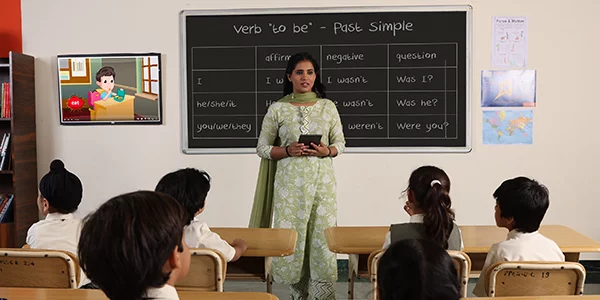Expert Primary Science Tuition Singapore for Understanding Complex Concepts
Expert Primary Science Tuition Singapore for Understanding Complex Concepts
Blog Article
Discovering the Various Teaching Methods in Key Science Education Today
The landscape of key scientific research education is developing, with numerous teaching approaches getting prominence in modern classrooms. Inquiry-based discovering, hands-on experiments, and the combination of innovation are redefining just how teachers engage young minds. In addition, collaborative approaches and set apart direction are being employed to cater to the varied demands of pupils, improving both engagement and understanding. As we examine these methodologies, inquiries occur concerning their effectiveness and the ramifications for future educational practices. What might these shifts in approach mean for the future generation of learners?
Inquiry-Based Knowing
Inquiry-Based Knowing (IBL) is a pedagogical method that motivates pupils to check out scientific concepts through doubting, examination, and hands-on testing. This technique highlights the role of pupils as active participants in their knowing, promoting essential thinking and analytical abilities. By involving with real-world inquiries, students end up being curious and determined, which boosts their understanding of scientific principles.
In IBL, educators serve as facilitators, directing trainees as they navigate their questions instead of delivering information directly. This student-centered technique enables differentiation, accommodating various discovering styles and speeds. Pupils create skills in developing hypotheses, making experiments, and analyzing information, which are essential for scientific proficiency.
Furthermore, IBL fosters collaboration amongst trainees, motivating them to share searchings for and ideas. This collective inquiry advertises social skills and a feeling of neighborhood within the class. The procedure of inquiry encourages durability, as pupils discover to accept failing as a tipping rock towards understanding.
Hands-On Experiments
Hands-on experiments are an essential element of efficient science education, complementing the principles of inquiry-based learning. These experiments allow students to engage directly with clinical principles, fostering a much deeper understanding with experiential understanding. By adjusting products and observing end results, young students can grasp abstract theories in substantial methods.
Such activities promote important thinking and analytic abilities, as students assume end results, conduct experiments, and assess results. This process motivates them to ask concerns, refine their understanding, and create a scientific frame of mind. Hands-on experiments can be tailored to varied understanding designs, ensuring that all students have the chance to involve meaningfully with the content.
Additionally, hands-on experiments typically urge collaboration among peers, promoting synergy and interaction abilities. Functioning in teams makes it possible for trainees to share ideas, review searchings for, and pick up from each other, which improves their overall educational experience.
Including hands-on experiments into the key scientific research curriculum not just improves the finding out atmosphere however likewise cultivates a lifelong interest in science. By actively participating in their education and learning, trainees are much more likely to create an enthusiasm for scientific inquiry that prolongs beyond the class.

Modern Technology Combination
Integrating technology right into key scientific research education has become progressively crucial in promoting pupil engagement and enhancing learning outcomes. The usage of digital devices, such as interactive simulations, digital laboratories, and educational software, gives students with opportunities to discover scientific principles in cutting-edge means. These sources help with a much deeper understanding of complex subjects by allowing learners to imagine and adjust variables that would be impractical in a conventional class setting.
Additionally, modern technology integration urges personalized finding out experiences. Trainees can proceed at their own rate, revisiting difficult concepts with multimedia resources, which cater to different knowing styles. This versatility not only sustains private growth but also grows a sense of freedom in students.
Furthermore, innovation acts as a bridge to real-world science, attaching pupils with current research and professional payments. Access to clinical journals and on-line databases broadens trainees' viewpoints on scientific questions and cultivates essential believing abilities.
Collaborative Knowing
Collaborative knowing plays a crucial role in primary scientific research education by cultivating synergy and communication skills amongst pupils. This method motivates students to work together, share understanding, and take part in analytic, which improves their understanding of clinical ideas. By taking part in team activities, trainees discover to verbalize their concepts, listen to varied viewpoints, and negotiate solutions, all of which are necessary abilities in both real-world and scholastic contexts.

Research study indicates that joint knowing can read bring about raised inspiration and involvement in science topics, as pupils find pleasure in shared experiences (primary science tuition Singapore). In addition, this method prepares trainees for future collaborative undertakings, furnishing them with the abilities necessary for efficient synergy in higher education and learning and specialist environments. Eventually, accepting collective my blog discovering in main scientific research education and learning can significantly enhance the discovering experience and advertise a much deeper understanding of scientific inquiry
Set Apart Guideline

Separated direction can materialize in different means, such as differing the material, processes, or products of learning. Instructors may make use of tiered assignments that supply differing levels of intricacy, enabling students to function at their corresponding preparedness levels. In addition, versatile grouping strategies can facilitate cooperation among pupils with different capabilities, fostering peer learning.
Evaluation plays an essential function in this approach, as it educates direction and aids teachers understand each trainee's distinct requirements. Formative analyses, such as quizzes and monitorings, can assist teachers in changing their approaches to improve discovering end results. primary science tuition Singapore. Ultimately, by applying distinguished guideline in primary scientific research education, teachers can grow a more efficient and fair learning atmosphere, encouraging all students to reach their full possibility in understanding scientific sensations
Conclusion
In summary, the diverse mentor strategies in primary science education and learning, including inquiry-based knowing, hands-on experiments, modern technology integration, collaborative knowing, and separated guideline, collectively add to a more efficient knowing atmosphere. These techniques advertise vital reasoning, analytic abilities, and a much deeper understanding of clinical concepts. By implementing view website these strategies, educators can create appealing and supportive classrooms that deal with the diverse requirements of students, eventually promoting a long-lasting rate of interest in science and boosting scholastic success.
Inquiry-Based Understanding (IBL) is a pedagogical method that urges trainees to discover scientific concepts through questioning, investigation, and hands-on testing.Collective knowing plays a vital duty in key scientific research education and learning by cultivating team effort and communication abilities amongst students.Research study shows that collaborative learning can lead to raised motivation and involvement in science topics, as students find satisfaction in shared experiences.In cultivating an inclusive discovering environment, differentiated guideline arises as a vital method to fit the varied requirements and abilities of trainees in primary scientific research education. Inevitably, by carrying out differentiated direction in main science education and learning, teachers can grow a more fair and reliable learning atmosphere, encouraging all pupils to reach their full possibility in understanding clinical sensations.
Report this page